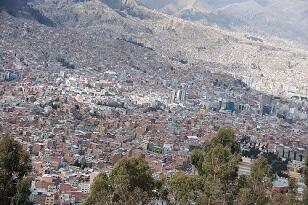Bolivian strategy on climate change
A visit to the Graduate Institute in Geneva is usually an interesting way to spend a couple of hours after work, and this Tuesday was no exception, with Rene Orellana, Ambassador and Chief Negotiator of the Plurinational State of Bolivia at the UNFCCC speaking about his country’s vision for post-2015 sustainable development goals and its climate change policy.
Bolivia under threat from climate change
Bolivia is highly vulnerable to the impacts of climate change. Glaciers have long provided water for agriculture and electricity. Across the Andes, 100 million people rely on these “water silos” to survive. According to the World Bank, they are under direct threat from rising temperatures. As glaciers recede and the availability of water from the glaciers declines, agricultural areas are being abandoned. This has created the first generation of climate refugees. Cities like La Paz now have to provide these migrants living in newly-created slums with shelter, water and other services.
La Paz – receiving climate refugees
Image: Faruquitown, flickr
Several themes emerged from the Ambassador’s talk:
Adaptation finance is a priority for Bolivia
The Ambassador stated that Bolivia’s engagement at the international level is based on “national discussions” rather than having policies imposed upon them. He feared that initiatives like UNEP’s Green Economy would open the door for a “mitigation agenda” to be imposed on the country, at a time when greater commitments from developed countries on reducing their emissions were needed and adaptation financing was not available as had been promised.
In the negotiations on how post-2015 Sustainable Development Goals (SDGs) will look, Bolivia is holding national discussions about the “kind of development we want”. Bolivia is building a proposal for the SDGs that “links climate change, biodiversity and the crisis of capitalism that is bringing challenges to our model of development”.
A law for Mother Earth not market measures
At the same time, Bolivia largely rejects market-based measures (e.g. paying for environmental services through REDD+) as a tool with which to fight climate change and fund development. These measures “make us believe that they will provide enough resources to solve poverty in peasant communities.
The Ambassador was critical about the description of nature as a “capital stock” in which you have to invest to generate revenue. Bolivia has developed an alternative concept through its national “Law of Mother Earth”. The law establishes 11 new rights of nature including the right to exist, rights for indigenous peoples, for women, for pure water and air, for the state to protect its people.
There was little time left to discuss in detail how the Law was being implemented, although there was some discussion about whether Bolivia’s rejection of market-based mechanisms was “throwing the baby out with the bathwater”, i.e. some policies like REDD+ or paying countries to keep oil in the ground (like Ecuador has proposed) could generate useful income for development. The Ambassador said that the latter had not worked and so did not see Bolivia ever taking such payments.
The evening only touched on the surface of how Bolivia engages with the world on climate policy, but it did give a glimpse of how different Bolivia’s view is about the role of markets in fighting climate change compared to most other countries both in the Andes and from around the world. However, all countries in the region including Bolivia appear to share a common understanding of the severe problems they face from the receding glaciers.
If you liked this blog post please nominate the ITC Environment blog (Category (Best New Blog)) for the 2013 Best Institutional Development Blog.
Back to the main page of ITC environment blog.
You can also follow Alex on Twitter.




